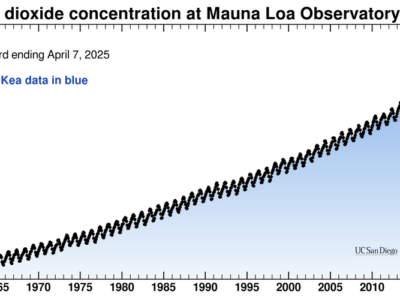Science
Touched by the Keeling Curve
Teaching the Keeling Curve in International Environmental Law has me reflecting on the role of climate science then and now.
Teaching the climate change unit last week in my International Environmental Law and Policy class, I found myself so moved that I started crying at the board. My poor students thought I was in distress. I was simply telling the story of the Keeling Curve. That’s a daily record of global atmospheric carbon dioxide concentration devised by …
Continue reading “Touched by the Keeling Curve”
CONTINUE READINGWhy Stand Up for Science? Ask Kim Stanley Robinson
The acclaimed science fiction author says at a UCLA talk that Trump’s attack on science is “a murder suicide” that won’t work because “you cannot kill the future.”
One day before thousands of Americans took to the streets to protest cuts to scientific research, Kim Stanley Robinson gave a barn burner of a defense of science in the “Optimist Room” of a UCLA conference center. The author of “The Ministry for the Future,” “The Mars Trilogy,” and other books with scientists and climate …
Continue reading “Why Stand Up for Science? Ask Kim Stanley Robinson”
CONTINUE READINGU.S. Resistance to Trump is Alive and Well
Thousands of people rallied at more than 100 Stand Up for Science events from Missouri to France. Where will the movement go from here?
Several thousands of people took to the streets this past weekend in more than 100 cities to protest the Trump administration’s wide-ranging attacks on vital scientific research, including its attempts to slash funding to the National Institutes of Health and hence local universities and research labs across the country. The result was small but potent …
Continue reading “U.S. Resistance to Trump is Alive and Well”
CONTINUE READINGThe problem with “follow the science”
Science is necessary, but not sufficient, for good policymaking
In the wake of the poor performance of the Trump Administration’s efforts to address the coronavirus pandemic in the United States, there has been advice that the Biden Administration should “follow the science” in developing its coronavirus policies and strategies. While an emphasis on a clean break from the prior Administration’s rejection of the nature …
Continue reading “The problem with “follow the science””
CONTINUE READINGUCLA Law Faculty Weigh In on Solar Geoengineering Experiment at Harvard
How to engage the public when everyone on Earth is a stakeholder?
It’s been a surprisingly busy year for solar geoengineering research. In late December, Congress appropriated $4 million to NOAA to study the influence of atmospheric aerosols on climate, with an eye on assessing “solar climate interventions.” In March, Australian scientists ran a trial of a cloud-seeding technology on the Great Barrier Reef that may …
Continue reading “UCLA Law Faculty Weigh In on Solar Geoengineering Experiment at Harvard”
CONTINUE READINGAnimal, vegetable or mineral?
A lesson in judicial humility and a thought experiment about property rights
This topic may be a bit far afield for this blog, but dinosaurs are always worth considering . . . The Montana Supreme Court has resolved an intriguing dispute about ownership of fossilized dinosaur remains that turned on the question of whether those remains were or were not “minerals.” In the process, the Montana court …
Continue reading “Animal, vegetable or mineral?”
CONTINUE READING100 Law Professors Urge EPA to Withdraw Revamped “Transparency in Science” Rule
EPA’s new proposal would go beyond even the far-reaching original to limit agency use of the best science
Today, on behalf of 100 environmental and administrative law professors affiliated with 70 universities in 33 states and the District of Columbia, Sean Hecht and I filed a comment letter urging EPA to withdraw its updated proposal to limit the use of science in agency decisionmaking processes, misleadingly named the “Strengthening Transparency in Science” rule. …
Continue reading “100 Law Professors Urge EPA to Withdraw Revamped “Transparency in Science” Rule”
CONTINUE READINGWillful Ignorance
As with climate science, Trump is in denial about public health issues.
Anti-vaxxers are a lot like the climate denial crowd, but with two differences. First, there hasn’t been any corporate money fomenting skepticism about vaccines, unlike climate denial. Second, anti-vaxxers are sprinkled across the ideological spectrum. Still, the similarities between these two forms of anti-scientism are greater. One big similarity: both anti-science views have the support …
Continue reading “Willful Ignorance”
CONTINUE READINGCan We Trust the Science? The Challenge of Irreproducible Results
In the peer review process, articles submitted to scientific journals are sent to experts in the field who then assess the methodology, results and conclusions. Based on their feedback, authors often revise and re-submit, publishing an improved article as a result. Peer reviewers rarely attempt the actual experiments described in the paper. Irreproducible results are …
Continue reading “Can We Trust the Science? The Challenge of Irreproducible Results”
CONTINUE READINGShould Environmental News Coverage Be In The Science Section?
A whiles back I wrote about how the New York Times’ environmental coverage had been in decline. The public editor at the Times has a new article stating that environmental coverage has recently increased substantially. I think that is a great thing. But I want to focus on another element of the public editor’s article. …
Continue reading “Should Environmental News Coverage Be In The Science Section?”
CONTINUE READING









